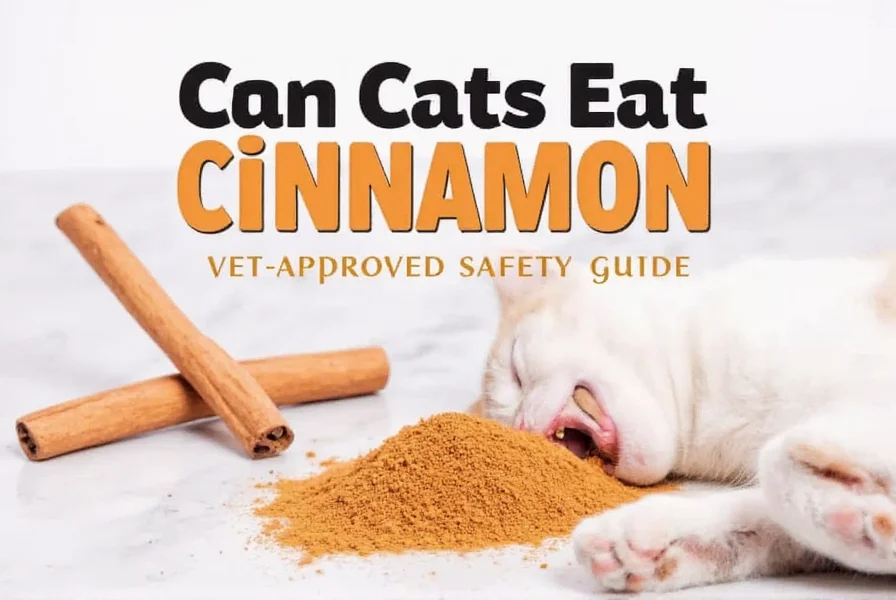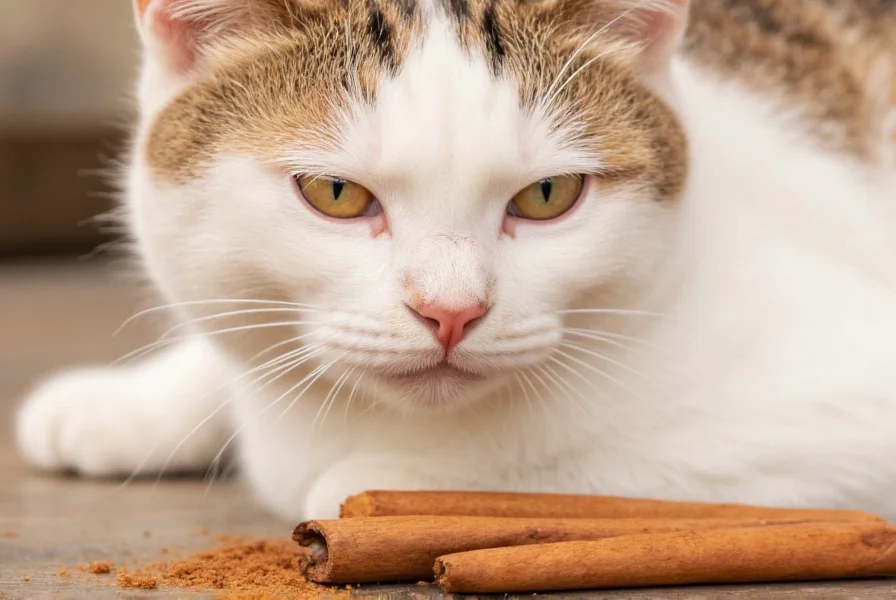Cats should not eat cinnamon. While small accidental exposures are unlikely to cause severe harm, cinnamon contains compounds like coumarin and cinnamaldehyde that can irritate a cat's digestive system, respiratory tract, and skin. Ingestion may lead to vomiting, diarrhea, low blood sugar, and liver damage in severe cases. Even cinnamon essential oils pose significant risks through inhalation or skin contact.
As a pet owner, understanding which human foods are safe for your feline companion is crucial for their wellbeing. Cinnamon appears in many household products from baked goods to air fresheners, making accidental exposure a real possibility. This comprehensive guide examines the scientific evidence behind cinnamon's effects on cats and provides practical advice for concerned pet owners.
Understanding Cinnamon's Composition and Feline Physiology
Cats have fundamentally different metabolic pathways than humans. Their livers lack certain enzymes needed to process compounds found in many human foods and spices. Cinnamon contains several bioactive components that interact poorly with feline biology:
- Cinnamaldehyde - The primary compound responsible for cinnamon's flavor and aroma, which can cause oral irritation and digestive upset
- Coumarin - A naturally occurring substance that can cause liver toxicity at higher doses
- Eugenol - Found in higher concentrations in cinnamon bark, potentially toxic to cats
Unlike humans and even dogs, cats cannot efficiently metabolize these compounds, making them more susceptible to adverse effects even from small exposures.

Scientific Evidence on Cinnamon and Cats
While comprehensive feline-specific studies on cinnamon toxicity are limited, veterinary research indicates several concerning mechanisms:
| Exposure Type | Potential Symptoms | Severity Level |
|---|---|---|
| Oral Ingestion (small amount) | Mild mouth irritation, temporary drooling | Low |
| Oral Ingestion (moderate amount) | Vomiting, diarrhea, decreased appetite | Moderate |
| Oral Ingestion (large amount) | Low blood sugar, rapid heart rate, liver damage | High |
| Inhalation (powder or essential oil) | Breathing difficulties, coughing, nasal irritation | Moderate to High |
| Skin Contact (essential oil) | Skin irritation, chemical burns | Moderate |
The American Society for the Prevention of Cruelty to Animals (ASPCA) lists cinnamon as a potential irritant for cats. Research published in the Journal of Feline Medicine and Surgery notes that essential oils containing cinnamon compounds can cause central nervous system depression and liver damage in cats due to their unique metabolic pathways.
Different Forms of Cinnamon and Their Risks
Not all cinnamon exposures carry equal risk. Understanding the different forms helps assess potential danger:
Cinnamon Powder
Ground cinnamon poses moderate risk primarily through inhalation. If your cat sniffs cinnamon powder, it can cause respiratory irritation, sneezing, and potentially more serious breathing difficulties. Ingestion of small amounts might cause mild stomach upset.
Cinnamon Sticks
Whole cinnamon sticks present lower immediate risk as cats are unlikely to chew them extensively. However, if a cat manages to break off and ingest pieces, the same compounds become problematic.
Cinnamon Essential Oils
This represents the highest risk category. Essential oils are highly concentrated and can cause severe toxicity through multiple exposure routes:
- Inhalation - Can cause respiratory distress and central nervous system effects
- Skin contact - May cause chemical burns and is readily absorbed
- Ingestion - Even small amounts can lead to serious toxicity
Veterinarians strongly advise against using cinnamon essential oils in households with cats, especially in diffusers where airborne particles can be inhaled.
What to Do If Your Cat Eats Cinnamon
If your cat has been exposed to cinnamon, follow these evidence-based steps:
- Assess the exposure - Determine what form of cinnamon was involved and estimate the amount
- Remove remaining cinnamon - Prevent further exposure
- Do not induce vomiting - This could cause additional irritation
- Contact your veterinarian - Provide details about the exposure
- Monitor for symptoms - Watch for vomiting, diarrhea, breathing difficulties, or unusual behavior
For essential oil exposures, wipe any oil from your cat's fur with a damp cloth and move them to fresh air immediately. Never apply water or other substances to the affected area.
Preventing Cinnamon Exposure in Your Home
Proactive measures can significantly reduce risk:
- Store spices securely in closed cabinets
- Avoid using cinnamon-scented candles or diffusers
- Be cautious with baked goods containing cinnamon
- Keep essential oils completely out of reach
- Supervise your cat in areas where spices are used
Remember that cats are naturally curious and may investigate kitchen counters or storage areas. Creating physical barriers to spice storage provides the most reliable protection.
Safe Alternatives for Cat Owners
If you're looking for pet-safe scents or natural remedies, consider these alternatives:
- Catnip - Naturally appealing to most cats and completely safe
- Valerian root - A safe alternative scent that many cats enjoy
- Plain oats or rice - For homemade cat treats
- Pumpkin puree - Small amounts can aid digestion
Always introduce new foods or scents gradually and in small quantities to monitor your cat's reaction.
When to Seek Veterinary Care
Contact your veterinarian immediately if your cat shows any of these symptoms after cinnamon exposure:
- Difficulty breathing or rapid breathing
- Excessive drooling or vomiting
- Lethargy or unusual weakness
- Tremors or seizures
- Loss of appetite lasting more than 12 hours
Early intervention significantly improves outcomes for potential toxicity cases. Your vet may recommend supportive care, activated charcoal, or other treatments depending on the severity of exposure.
Conclusion
While cinnamon isn't among the most toxic substances for cats, it certainly doesn't belong in your feline friend's diet. The potential risks outweigh any theoretical benefits, and safer alternatives exist for both culinary and aromatic purposes. By understanding the science behind cinnamon's effects on cats and taking appropriate precautions, you can help ensure your pet remains healthy and safe in a cinnamon-containing household.
Frequently Asked Questions
Is a small amount of cinnamon harmful to cats?
While a tiny accidental exposure (like a single lick) is unlikely to cause serious harm, even small amounts of cinnamon can cause digestive upset in cats. Cats lack certain liver enzymes needed to process compounds in cinnamon, making them more sensitive than humans. Repeated small exposures could potentially lead to more serious issues over time, so it's best to prevent any exposure.
What are the symptoms if my cat eats cinnamon?
Symptoms of cinnamon exposure in cats may include vomiting, diarrhea, drooling, decreased appetite, low blood sugar (manifesting as weakness or lethargy), and in severe cases, rapid heart rate or liver damage. Inhalation of cinnamon powder can cause respiratory irritation, coughing, and breathing difficulties. Symptoms typically appear within a few hours of exposure.
Can cats be allergic to cinnamon?
Yes, cats can develop allergic reactions to cinnamon. Signs of an allergic reaction include skin irritation, excessive scratching, facial swelling, hives, and in severe cases, difficulty breathing. If you notice these symptoms after potential cinnamon exposure, contact your veterinarian immediately as allergic reactions can escalate quickly.
Is cinnamon oil more dangerous than ground cinnamon for cats?
Yes, cinnamon essential oil is significantly more dangerous than ground cinnamon. Essential oils are highly concentrated, containing up to 70 times more active compounds than the raw spice. Even small amounts of cinnamon oil can cause severe toxicity through skin absorption, inhalation, or ingestion. Veterinarians strongly advise against using cinnamon essential oils in homes with cats, especially in diffusers where the oil becomes airborne.
How much cinnamon is toxic to cats?
There's no precise established toxic dose for cats, as individual sensitivity varies. However, veterinary toxicologists consider any intentional feeding of cinnamon to be unsafe. Even 1-2 teaspoons of ground cinnamon could cause significant gastrointestinal upset in an average-sized cat. For cinnamon essential oil, exposure to just a few drops can potentially cause serious toxicity. When in doubt, prevent all exposure and consult your veterinarian.











 浙公网安备
33010002000092号
浙公网安备
33010002000092号 浙B2-20120091-4
浙B2-20120091-4